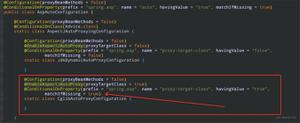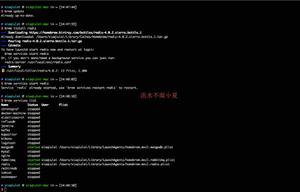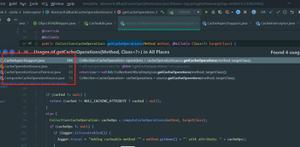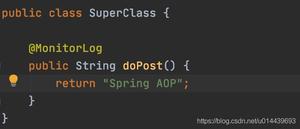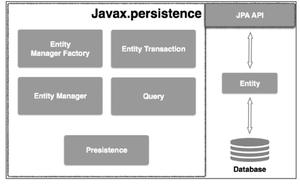Spring:使用Spring AOP时,如何获取目标方法上的注解
本文内容纲要:Spring:使用Spring AOP时,如何获取目标方法上的注解
当使用spring AOP时,判断目标方法上的注解进行相关操作,如缓存,认证权限等
自定义注解
package com.agent.annotation;import java.lang.annotation.ElementType;
import java.lang.annotation.Retention;
import java.lang.annotation.RetentionPolicy;
import java.lang.annotation.Target;
import org.springframework.stereotype.Component;
@Component
@Retention(RetentionPolicy.RUNTIME)
@Target(ElementType.METHOD)
public @interface MyAnnotation {
public boolean isEnable() default true;
}
Spring AOP的AspectJ
package com.agent.aop;import java.lang.reflect.Method;
import org.aspectj.lang.ProceedingJoinPoint;
import org.aspectj.lang.annotation.Around;
import org.aspectj.lang.annotation.Aspect;
import org.springframework.stereotype.Component;
import com.agent.annotation.MyAnnotation;
@Component
@Aspect
public class LogUtil {
@Around("@annotation(com.agent.annotation.MyAnnotation)")
public Object logWrited(ProceedingJoinPoint point) throws Throwable {
Object[] args = point.getArgs();
Class<?>[] argTypes = new Class[point.getArgs().length];
for (int i = 0; i < args.length; i++) {
argTypes[i] = args[i].getClass();
}
Method method = null;
try {
method = point.getTarget().getClass()
.getMethod(point.getSignature().getName(), argTypes);
} catch (NoSuchMethodException e) {
e.printStackTrace();
} catch (SecurityException e) {
e.printStackTrace();
}
MyAnnotation ma = method.getAnnotation(MyAnnotation.class);
System.out.println(ma.isEnable());
return point.proceed();
}
}
Service接口
package com.agent.service;public interface UserService {
void addUser(String name, String password);
}
service接口的实现类,被自定义注解所注解
package com.agent.service.impl;import org.springframework.stereotype.Service;
import com.agent.annotation.MyAnnotation;
import com.agent.service.UserService;
@Service(value="userService")
public class UserServiceImpl implements UserService {
@Override
@MyAnnotation
public void addUser(String name, String password) {
System.out.println("UserServiceImpl.addUser()...... name: " + name + "; password: " + password);
}
}
测试类:
package com.agent.test;import org.springframework.context.ApplicationContext;
import org.springframework.context.support.ClassPathXmlApplicationContext;
import com.agent.service.UserService;
public class AOPTest {
public static void main(String[] args) {
ApplicationContext ac = new ClassPathXmlApplicationContext("applicationContext.xml");
UserService us = (UserService)ac.getBean("userService");
us.addUser("张三", "188");
}
}
Spring的配置文件:
<?xml version="1.0" encoding="utf-8"?><beans xmlns="http://www.springframework.org/schema/beans"
xmlns:xsi="http://www.w3.org/2001/XMLSchema-instance"
xmlns:context="http://www.springframework.org/schema/context"
xmlns:aop="http://www.springframework.org/schema/aop"
xmlns:tx="http://www.springframework.org/schema/tx"
xsi:schemaLocation="http://www.springframework.org/schema/beans
http://www.springframework.org/schema/beans/spring-beans.xsd
http://www.springframework.org/schema/context
http://www.springframework.org/schema/context/spring-context.xsd
http://www.springframework.org/schema/aop
http://www.springframework.org/schema/aop/spring-aop.xsd
http://www.springframework.org/schema/tx
http://www.springframework.org/schema/tx/spring-tx.xsd">
<context:component-scan base-package="com.agent" />
<!-- <bean id="aspect" class="com.agent.aop.LogUtil" />
<aop:config>
<aop:aspect ref="aspect">
<aop:pointcut expression="execution(* add*(..))" id="mypointcut"/>
<aop:after method="logWrited" pointcut-ref="mypointcut"/>
<aop:around method="logWrited" pointcut-ref="mypointcut" />
</aop:aspect>
</aop:config>
-->
<aop:aspectj-autoproxy/>
</beans>
测试结果:

如果使用的是接口的模式,而注解在实现类上,则不能使用如下方式获取目标方法的对象,因为该方式获取的是该类的接口或者顶级父类的方法的对象
MethodSignature methodSignature = (MethodSignature)point.getSignature(); Method method = methodSignature.getMethod();
本文内容总结:Spring:使用Spring AOP时,如何获取目标方法上的注解
原文链接:https://www.cnblogs.com/djoker/p/7977166.html
以上是 Spring:使用Spring AOP时,如何获取目标方法上的注解 的全部内容, 来源链接: utcz.com/z/296891.html

